Disclosure: We may earn commissions if you purchase products after clicking on a link from our site.
Are you interested in learning how to catch blue catfish? Blue catfish grow to be large fish and are voracious bottom feeders. They will put up a hard fight when caught. It is native to the Mississippi River basin but has been introduced into other areas.
In this article, we discuss how to catch blue catfish, the best fishing methods, the bait, lures, fishing tackle, the best spots for fishing, and fishing tips to take more blue catfish home.

Table of Contents
- 1 How To Catch Blue Catfish
- 2 Best Baits For Blue Catfish
- 3 Best Lures For Blue Catfish
- 4 Blue Catfish Fishing Tackle
- 5 Best Fishing Rigs For Blue Catfish
- 6 How To Catch Blue Catfish In A Lake
- 7 How To Catch Blue Catfish From Shore
- 8 How To Catch Blue Catfish In Winter
- 9 How To Catch Blue Catfish In The Fall
- 10 How To Catch Blue Catfish In A Pond
- 11 How To Catch Blue Catfish In Rivers
- 12 How To Catch Blue Catfish In Chesapeake Bay
- 13 Blue Catfish vs Channel Catfish
- 14 Blue Catfish Fishing Tips
- 15 The Bottom Line
How To Catch Blue Catfish
Blue catfish eat almost anything and are often found at the bottom preying on crayfish, crabs, herring, shad, and other baitfish. Live bait and artificial lures work well when fishing for blue catfish. As bottom feeders, anglers implement fishing methods that are effective in blue catfish such as bottom fishing, drift fishing and still fishing.
1. Bottom Fishing
Bottom fishing is a traditional and effective method for catching blue catfish, particularly in rivers, lakes, or reservoirs with deep waters and strong currents. Anglers utilize heavy tackle and sinking rigs to present baits such as cut bait, shad, or chicken liver near the bottom, where blue catfish often forage for food.
The key to success with bottom fishing for blue catfish lies in selecting the right bait and presenting it effectively in areas with submerged structures or drop-offs where catfish are likely to be holding. Anglers can anchor their boats or fish from the shore, allowing their baits to settle on the bottom and attract nearby catfish.
By remaining patient and attentive to their rods, anglers can detect subtle bites and effectively catch blue catfish using the bottom fishing technique. For more information on bottom fishing techniques for blue catfish, anglers can visit the official website of the United States Fish and Wildlife Service.
2. Drift Fishing
Drift fishing is a dynamic and productive method for targeting blue catfish, especially in large rivers or reservoirs with moderate current flow. Anglers use drifting rigs or drift socks to allow their boats to move naturally with the current while trailing lines baited with natural or artificial baits such as shad, skipjack herring, or large worms.
The key to successful drift fishing for blue catfish is to cover a wide area of water and present baits at various depths and locations to locate actively feeding fish. Anglers can target areas with submerged structures, underwater channels, or deep holes where blue catfish are likely to congregate.
By adjusting their drifting speed and direction to match the current flow, anglers can effectively entice strikes from blue catfish. Drift fishing requires anglers to remain vigilant and responsive to changing conditions, but with practice, it can be a highly rewarding method for catching blue catfish.
3. Still Fishing
Still fishing, also known as anchoring or bottom fishing, is a popular and effective method for targeting blue catfish in various freshwater environments. Anglers employ this technique by anchoring their boats or securing themselves to the shoreline and presenting baited lines near the bottom of the water column, where blue catfish frequently forage for food.
To catch blue catfish using still fishing, anglers typically use heavy tackle and rig their lines with natural baits such as cut bait, shad, or chicken liver. The key to success with still fishing for blue catfish lies in selecting the right bait and presenting it effectively in areas with submerged structures, drop-offs, or underwater channels where catfish are likely to be holding.
Anglers can adjust the depth of their bait presentation by varying the weight of their sinkers or by using a slip bobber to suspend their bait at a desired depth. By remaining patient and attentive to their rods, anglers can detect subtle bites and effectively catch blue catfish using the still fishing technique.
Overall, still fishing provides anglers with a reliable and productive method for catching blue catfish in a variety of freshwater environments. For more tips on how to catch blue catfish using still fishing, anglers can consult resources provided by state fish and wildlife agencies or visit websites dedicated to freshwater fishing techniques.
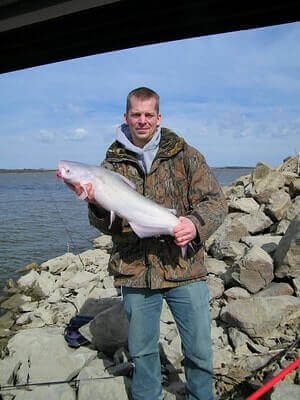
4. Baitcasting
Baitcasting is a popular and effective fishing method for targeting blue catfish, offering anglers precision and control when presenting baits in various freshwater environments. To catch blue catfish using baitcasting, anglers typically use a baitcasting reel paired with a sturdy fishing rod capable of handling heavy lines and large baits.
The key to success with baitcasting for blue catfish lies in selecting the right bait and presenting it effectively in areas with submerged structures, drop-offs, or underwater channels where catfish are likely to be holding. Anglers often use natural baits such as cut bait, shad, or chicken liver, which are rigged on heavy-duty hooks and cast out into the water using the baitcasting reel.
Anglers can adjust the casting distance and accuracy by controlling the tension and braking system of the reel, allowing them to precisely target specific areas where blue catfish are likely to be lurking. By remaining patient and attentive to their rods, anglers can detect subtle bites and effectively catch blue catfish using the baitcasting technique.
Overall, baitcasting provides anglers with a versatile and productive method for catching blue catfish in a variety of freshwater environments. For more tips on how to catch blue catfish using baitcasting, anglers can consult resources provided by state fish and wildlife agencies or visit websites dedicated to freshwater fishing techniques.
5. Jug Fishing
Jug fishing is a passive and efficient method for catching blue catfish, particularly in large bodies of water such as lakes or reservoirs with moderate current flow. Anglers use floating jugs or buoys rigged with baited lines to target blue catfish in areas with moderate current flow or wind drift.
The baited lines are typically rigged with a variety of baits such as live or cut bait, and the jugs are set adrift in the water, allowing them to passively drift with the current or wind. When a blue catfish takes the bait, the jug will bob or move, indicating a strike. Anglers can then retrieve the jug and reel in the fish. Jug fishing can be an effective way to cover a large area of water and locate actively feeding blue catfish.
Best Baits For Blue Catfish
- Shad
Shad is a highly effective and popular bait choice for catching blue catfish, offering anglers a natural and enticing option to entice strikes from these prized freshwater gamefish. To use shad as bait for catching blue catfish, anglers typically rig them whole or as cut bait on heavy-duty hooks and present them near the bottom of the water column, where catfish often forage for food.
The key to success with using shad for catching blue catfish lies in selecting fresh, lively shad and presenting them in areas with submerged structures, drop-offs, or underwater channels where catfish are likely to be holding. Anglers can target these areas from boats or the shoreline, allowing their shad baits to drift naturally with the current or be anchored in place.
By allowing the shad to emit natural scents and movements in the water, anglers can increase their chances of enticing strikes from nearby blue catfish. It’s essential to handle shad carefully to maintain their freshness and liveliness, as fresh bait is more attractive to catfish.
Overall, shad provides anglers with a reliable and productive bait choice for catching blue catfish in a variety of freshwater environments. For more tips on how to catch blue catfish using shad, anglers can consult resources provided by state fish and wildlife agencies or visit websites dedicated to freshwater fishing techniques.
2. Herring
Herrings are an excellent bait choice for anglers targeting blue catfish, offering a natural and enticing option to entice strikes from these prized freshwater gamefish. To use herring as bait for catching blue catfish, anglers typically rig them whole or as cut bait on heavy-duty hooks and present them near the bottom of the water column, where catfish often forage for food.
Herring emit natural scents and movements that can attract catfish from a distance, making them particularly effective when used fresh and lively. Anglers can target areas with submerged structures, drop-offs, or underwater channels where blue catfish are likely to be holding, either from boats or from the shoreline.
By allowing the herring to emit natural scents and movements in the water, anglers can increase their chances of enticing strikes from nearby blue catfish. It’s essential to handle herring carefully to maintain their freshness and liveliness, as fresh bait is more attractive to catfish. Overall, herring provides anglers with a reliable and productive bait choice for catching blue catfish in a variety of freshwater environments.
3. Peeler Crabs
Peeler crabs, also known as shedding crabs, can be an effective bait choice for anglers targeting blue catfish. These crabs are at a vulnerable stage in their molting process, making them particularly enticing to predatory fish like blue catfish. To use peeler crabs as bait for catching blue catfish, anglers typically rig them on a hook or jighead and present them near the bottom of the water column, where catfish often forage for food.
Peeler crabs emit natural scents and movements that can attract catfish from a distance, especially when they are in the process of shedding their shell. Anglers can target areas with submerged structures, drop-offs, or underwater channels where blue catfish are likely to be holding, either from boats or from the shoreline.
By allowing the peeler crabs to emit natural scents and movements in the water, anglers can increase their chances of enticing strikes from nearby blue catfish. It’s essential to handle peeler crabs carefully to ensure they remain alive and active, as live bait is more attractive to catfish. Overall, peeler crabs provide anglers with a unique and productive bait choice for catching blue catfish in a variety of freshwater environments.
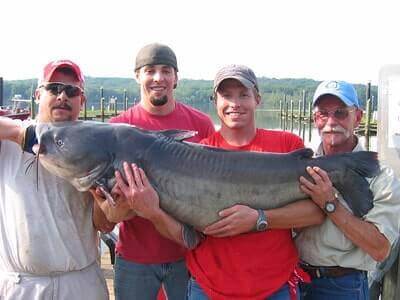
4. Menhaden
Menhaden, also known as bunker or pogies, are an exceptional bait choice for anglers targeting blue catfish. These oily and nutritious fish are highly attractive to blue catfish due to their natural scent and flavor. To use menhaden as bait for catching blue catfish, anglers typically rig them whole or as cut bait on heavy-duty hooks and present them near the bottom of the water column, where catfish often forage for food.
Menhaden emit a strong scent trail that can attract catfish from a distance, making them particularly effective when used fresh and lively. Anglers can target areas with submerged structures, drop-offs, or underwater channels where blue catfish are likely to be holding, either from boats or from the shoreline.
By allowing the menhaden to emit natural scents and movements in the water, anglers can increase their chances of enticing strikes from nearby blue catfish. It’s essential to handle menhaden carefully to maintain their freshness and liveliness, as fresh bait is more attractive to catfish. Overall, menhaden provides anglers with a reliable and productive bait choice for catching blue catfish in a variety of freshwater environments.
5. Crayfish
Crayfish are a natural and effective bait choice for anglers targeting blue catfish. These freshwater crustaceans are abundant in many bodies of water inhabited by blue catfish, making them an enticing option for bait. To use crayfish as bait for catching blue catfish, anglers typically rig them on a hook or jighead and present them near the bottom of the water column, where catfish often forage for food.
Crayfish emit natural scents and movements that can attract catfish from a distance, especially when they are in distress or attempting to evade predators. Anglers can target areas with submerged structures, drop-offs, or underwater channels where blue catfish are likely to be holding, either from boats or from the shoreline.
By allowing the crayfish to emit natural scents and movements in the water, anglers can increase their chances of enticing strikes from nearby blue catfish. It’s essential to handle crayfish carefully to ensure they remain alive and active, as live bait is more attractive to catfish. Overall, crayfish provide anglers with a natural and productive bait choice for catching blue catfish in a variety of freshwater environments.
6. Blue Crabs
Blue crabs are a highly effective bait choice for anglers targeting blue catfish. These crustaceans are native to many coastal and brackish waters where blue catfish thrive, making them a natural and enticing option for bait. To use blue crabs as bait for catching blue catfish, anglers typically rig them whole or as cut bait on heavy-duty hooks and present them near the bottom of the water column, where catfish often forage for food.
Blue crabs emit a strong scent that can attract catfish from a distance, especially when they are in distress or attempting to defend themselves. Anglers can target areas with submerged structures, drop-offs, or underwater channels where blue catfish are likely to be holding, either from boats or from the shoreline.
By allowing the blue crabs to emit natural scents and movements in the water, anglers can increase their chances of enticing strikes from nearby blue catfish. It’s essential to handle blue crabs carefully to ensure they remain alive and active, as live bait is more attractive to catfish. Overall, blue crabs provide anglers with a natural and productive bait choice for catching blue catfish in a variety of freshwater and brackish environments.
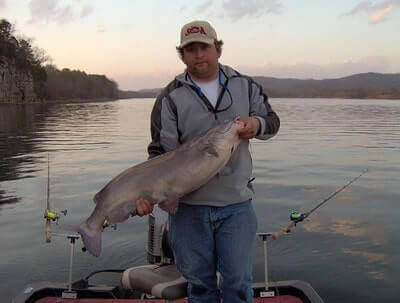
7. Mussels
Mussels can serve as an effective bait option for anglers targeting blue catfish in freshwater environments. These bivalve mollusks are naturally occurring in many bodies of water inhabited by blue catfish, making them readily available and enticing for bait. To use mussels as bait for catching blue catfish, anglers typically rig them on a hook or bait holder and present them near the bottom of the water column, where catfish frequently forage for food.
Mussels emit a natural scent and flavor that can attract catfish, especially when they are fresh and intact. Anglers can target areas with submerged structures, drop-offs, or underwater channels where blue catfish are likely to be holding, either from boats or from the shoreline.
By allowing the mussels to emit their natural scent and flavors in the water, anglers can increase their chances of enticing strikes from nearby blue catfish. It’s essential to handle mussels carefully to ensure they remain intact and securely rigged on the hook. Overall, mussels provide anglers with a natural and effective bait choice for catching blue catfish in a variety of freshwater environments.
Best Lures For Blue Catfish
- Jigs
Jigs are versatile lures that can be effective for catching blue catfish in various freshwater environments. Anglers can use jigs to mimic the movements of prey such as minnows, crayfish, or other small fish that blue catfish commonly feed on. To catch blue catfish using jigs, anglers typically cast them out and retrieve them slowly along the bottom of the water column, where catfish often forage for food.
Jigs can be tipped with natural baits such as cut bait, shrimp, or nightcrawlers to enhance their effectiveness and scent trail. Anglers can target areas with submerged structures, drop-offs, or underwater channels where blue catfish are likely to be holding.
By varying the retrieve speed and depth, anglers can experiment with different presentations to find what works best for enticing strikes from blue catfish. It’s essential to use jigs with heavy-duty hooks and strong lines to handle the powerful strikes of blue catfish.
Overall, jigs provide anglers with a versatile and productive lure option for catching blue catfish in a variety of freshwater environments. For more tips on how to catch blue catfish using jigs, anglers can consult resources provided by state fish and wildlife agencies or visit websites dedicated to freshwater fishing techniques.
Blue Catfish Fishing Tackle
There are many options for tackle when fishing for blue catfish. Blue catfish are ferocious fighters. They will give you a hard battle as they don’t want to leave the water. Therefore you will need a strong line and a heavy tackle. A medium heavy-action tackle with at least a 30 lb test will get the job done when learning how to catch blue catfish.
Additionally, a heavy leader is needed to prevent blue catfish from breaking the line. A reel with a minimum of 200 yards of the line will work when fishing for blue catfish. Some anglers use braided lines while others swear by monofilament lines. If you opt for braided lines, it should be at least one with a 50 lb test and for mono, it should be no less than a 17 lb test.
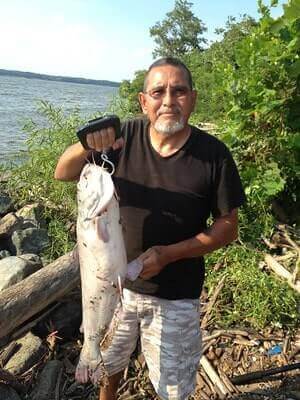
Best Fishing Rigs For Blue Catfish
1. The Carolina Rig
The Carolina Rig is a highly effective and popular rig used by anglers for targeting blue catfish in freshwater environments. This rig consists of a sliding sinker, followed by a bead or swivel, and then a leader line attached to a hook where the bait is presented. The sliding sinker allows the bait to move naturally along the bottom while minimizing resistance, making it an excellent choice for fishing in areas with submerged structures or rocky terrain where blue catfish often congregate.
To set up a Carolina Rig for catching blue catfish, anglers typically use heavy-duty tackle and strong leaders to handle the powerful strikes of these fish. Bait options for the Carolina Rig can include natural baits such as cut bait, shad, or chicken liver, which are rigged onto the hook to entice strikes from hungry catfish. Anglers can adjust the length of the leader line to vary the depth at which their bait is presented, allowing them to target specific areas where blue catfish are likely to be holding.
By mastering the Carolina Rig setup and presentation, anglers can increase their chances of success when targeting blue catfish in freshwater environments. Overall, the Carolina Rig provides anglers with a versatile and effective rigging option for catching blue catfish in a variety of fishing situations.
2. The 3-Way Rig
The 3-Way Rig is a popular rigging technique used by anglers to target blue catfish in freshwater environments. This rig consists of a mainline with a three-way swivel, with one end attached to a sinker and the other to a leader line with a hook where the bait is presented. The sinker helps to keep the baited hook near the bottom, where blue catfish often feed, while the leader line allows the bait to move freely in the water column.
The 3-Way Rig is particularly effective when fishing in areas with strong currents or turbulent waters, as it allows the bait to remain stable and visible to catfish. Anglers can use a variety of bait options with the 3-Way Rig, including natural baits such as cut bait, shad, or chicken liver, to entice strikes from blue catfish.
By adjusting the length of the leader line and the weight of the sinker, anglers can customize their rig to suit the specific fishing conditions and target areas where blue catfish are likely to be holding.
To learn more about rigging techniques like the 3-Way Rig for catching blue catfish, anglers can explore educational resources provided by universities and research institutions, such as this guide from the University of Kentucky: Link to University of Kentucky Fishing Guide. Overall, the 3-Way Rig offers anglers a versatile and effective method for targeting blue catfish in a variety of freshwater environments.
3. Santee Cooper Rig
The Santee Cooper Rig is a specialized setup tailored for targeting blue catfish in larger bodies of water, such as reservoirs, lakes, or rivers. This rigging technique utilizes multiple hooks arranged in a tandem fashion along a heavy mainline, typically with a weight positioned at the bottom to keep the rig anchored.
Anglers often use this rig to present a variety of baits simultaneously, increasing their chances of enticing strikes from blue catfish. To set up a Santee Cooper Rig for catching blue catfish, anglers typically use a sliding weight attached to the mainline, followed by a swivel to prevent line twists.
From the swivel, leaders of varying lengths are attached, each with a hook rigged with bait. Popular bait options for the Santee Cooper Rig include cut bait, shad, or live baitfish, all of which can be presented effectively to blue catfish in deeper waters. By positioning the baited hooks at different depths, anglers can target blue catfish that may be held at various levels in the water column.
The Santee Cooper Rig offers anglers a versatile and efficient method for targeting blue catfish in a variety of freshwater environments. For more tips on how to catch blue catfish using the Santee Cooper Rig, anglers can consult fishing guides, online resources, or experienced anglers familiar with this rigging technique.

How To Catch Blue Catfish In A Lake
Many areas on a lake can hold blue catfish. Points, deep holes, windy banks, and coves are prime targets for blue catfish.
Here is a tip: if you are on the banks of the lake at a spot where the wind is blowing straight into your face, that is a good area to target for blue catfish.Why? The wind will blow baitfish and other nutrients into the shoreline and this food source will attract blue catfish.
Points are good areas for casting into deep water. When you are not getting any luck in shallow waters, focus on points to get your baits deeper into the water column. Coves attract blue catfish as small baitfish like to gather in coves. This attracts blue catfish as this is an easy food source for them to target. Target from the back to the mouth of the cove for blue catfish.
Casting is one of the popular ways anglers fish for blue catfish on lakes. However, if it is a large lake, you can use a boat to drift fish, bottom fish, and also still fish.
How To Catch Blue Catfish From Shore
You can target blue catfish from the shore. Whether it is fishing from the shores of lakes, rivers, or ponds, you can find spots where they may be holding out and cast your bait there. Deep holes, points, coves, and windy banks are some of the areas to target when fishing for blue catfish from the shore.
When fishing for blue catfish from the shore, move around and observe if the wind is blowing into your face from the spot where you are standing. If the wind is blowing in your face, you have found a gold mine.
The wind also blows baitfish and other marine life in that direction and blue catfish will go to that area for an easy meal, and lots of meals. Cast into that area to catch blue catfish. You can use rods with a length of 8 ft or more to allow you to cast very far when fishing from the shore. Heavy spinning tackle is the best option when fishing from the shore, but baitcasting tackle also works.
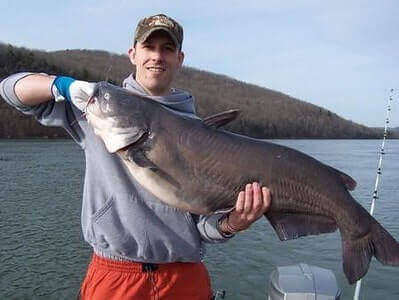
How To Catch Blue Catfish In Winter
During winter blue catfish will go deeper in the water column and seek cover to ambush baitfish. Rocks, logs, fallen trees, ledges, and other structures will be areas to target. Use fish finders, sonar devices, and ice fish finders to help locate where blue catfish are congregating.
Once you have areas to target, you drop your bait in that area and wait for a bite. Baitcasting and bottom fishing are fishing methods often used by anglers to catch blue catfish during winter.
How To Catch Blue Catfish In The Fall
During fall, blue catfish are faced with new sets of challenges. there will be fewer baitfish as they die when the water temperature starts to drop. Because of this change, there is less food for the catfish. Blue catfish will move from shallow water to deeper water as we move from fall to winter.
Use cut baits to target blue catfish that are settled deep in the water column. Bottom fishing, drift fishing, and baitcasting are fishing methods that are used to catch blue catfish.
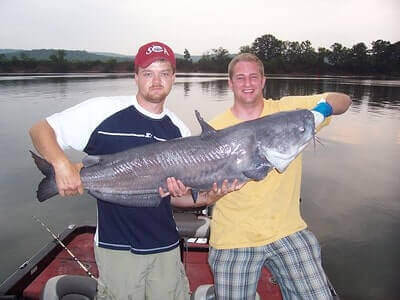
How To Catch Blue Catfish In A Pond
Fishing for blue catfish in a pond is similar to fishing in a lake or river. Choosing the right equipment and bait is crucial to a successful fishing trip. Light tackle will work for a pond and the regular baits used will also work for a pond. Live bait and cut baits will work when fishing from a pond. Baitcasting is the popular fishing method anglers use when fishing for blue catfish in a pond. Cast out your line, after it reaches the bottom, reel it back in.
How To Catch Blue Catfish In Rivers
When fishing for blue catfish in rivers, you can target structures, eddies, deep holes, and river mouths. Fallen trees, piers, rocks, barges, and sunken logs are structures to target when fishing for blue catfish on rivers.
The mouths of rivers are a great place to target blue catfish and many other species of fish as they hang around the mouth for baitfish. Many baitfish will travel through the mouth of a river and this is an easy spot to feed on baitfish. Find the bait and you will find blue catfish as they eat almost anything.
Blue catfish will move deeper in the water column during winter. Targeting deep holes will help you find blue catfish as they will settle in there preying on baitfish. You can also target blue catfish in current breaks as they wait in ambush in the current breaks for baitfish. When fishing for blue catfish in rivers, you can use several fishing methods like baitcasting, drift fishing, and bottom fishing.
How To Catch Blue Catfish In Chesapeake Bay
Blue catfish have been introduced into the Chesapeake Bay for more than two decades now. When fishing for blue catfish in the Chesapeake Bay, look for structures that they may use as cover such as channel edges, creek mouths, and flats.
Use the fish finder or sonar device to locate catfish and anchor up-current from where you will be fishing for blue catfish. Deeper holes and channel areas are prime areas to target for blue catfish. Most anglers cast out and retrieve that line when fishing for catfish. This is repeated until they get a bite.
Drift fishing can also be used to catch blue catfish. Bottom fishing is another fishing method that can be used to catch blue catfish on the Chesapeake Bay.
Blue Catfish vs Channel Catfish
| Blue Catfish | Channel Catfish | |
|---|---|---|
| Spotted | No | Yes |
| Anal Fin Rays | More, up to 30 |
Significantly fewer than Blue Catfish |
| Tail | Pointed Tail | Rounded Forked Tail |
| Size | Very large, weighs over 100 lbs | Average size, not more than 30 lbs |
Blue Catfish Fishing Tips
- Blue catfish during spring or summer when the water temperature is between 70 and 84 degrees Fahrenheit.
2. Blue catfish put up a serious fight when hooked.
3. Blue catfish can be caught all year round with the period between March and May being the best months.
4. Blue catfish are most active at night or in low-light conditions.
5. Blue catfish will take live and artificial bait.
6. Some anglers use bait with a foul odor such as cut herring, mud shad, or menhaden to attract blue catfish.
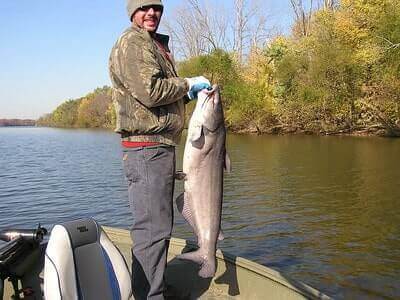
7. Blue catfish are voracious feeders and target crayfish, blue crabs, shad, and mussels.
8. Blue catfish are bottom dwellers.
9. The defense mechanism of blue catfish includes serrated spinal barbs or spines on their pectoral and dorsal fins that secrete toxins.
10. Live bait is the best bait for catching blue catfish. When learning how to catch blue catfish, use a lot of live bait.
11. Stinky bait works well when fishing for blue catfish. The odor of the bait will attract the catfish. Live bait with an odor is a perfect combination when targeting blue catfish.
12. Blue catfish have a very good sense of smell. As a result, baits with a foul odor will be more effective than regular bait when you are fishing for blue catfish. This is a good tip to remember when you are learning how to catch blue catfish.
13. Blue catfish grow to be big, therefore, use hooks with sizes ranging from 3/0 to 9/0. Circle hooks are the preferred choice for many anglers.
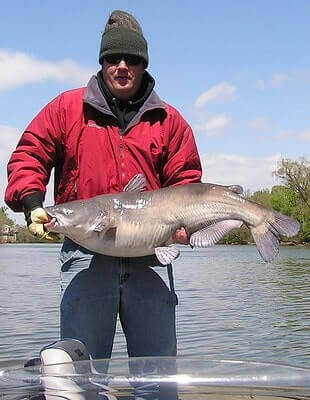
14. From your fish finder, look for areas that are deeper than the rest of the river. Blue catfish will most likely be in that area.
15. Circle hooks are the best hooks to use when fishing for blue catfish.
16. Look for current breaks as blue catfish will be around current breaks in ambush for baitfish.
17. Blue catfish grow large and fight hard. You will need a heavy tackle and a strong line to handle the ferocious fight of a blue catfish.
18. The right tackle and rigs will greatly improve your chances of catching blue catfish. The Carolina rig and the 3-way rig are some of the popular rigs used when fishing for blue catfish.
19. The position of the boat is important when fishing for blue catfish. Always position the boat up-current of the area you want to fish.
20. Tailwaters are a prime spot to target blue catfish and many other species of fish. A tailwater is the section of a river just below a dam. The current is swift in tailwaters and blue catfish, because of their size, can hold their own with the aid of large rocks, eddies, current breaks, and boulders. Baitfish are chopped up by turbines and dumped into the flow thus presenting a food supply for blue catfish.
The Bottom Line
Blue catfish are a favorite of anglers because they are ferocious fighters when caught. It grows to be a big fish and can be caught throughout the year and are bottom feeders. Additionally, they are voracious feeders and will eat almost anything.
Still fishing, drift fishing, bottom fishing, and baitcasting are some of the fishing methods used to catch blue catfish. Gizzard shad, herring, peeler crabs, menhaden, and crayfish are used as baits for blue catfish fishing.
The right equipment and bait are needed as blue catfish grow large and will fight you. In this article, we shared information about how to catch blue catfish to help you be successful with catfish fishing. If you fish for flathead catfish, you can also read how to catch flathead catfish, how to catch channel catfish, how to catch white catfish, and catfishing tips.